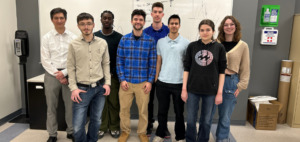Gear up for the future: Unleash your inner inventor
Posted on Tuesday, April 9th, 2024
National Robotics Week is celebrated annually from April 6 to 13. To mark the week, we look inside Algonquin College’s Bachelor of Engineering (Automation and Robotics) degree program.
Engineering (Automation and Robotics) degree program.
The days of robots working alongside humans is here and Algonquin College students are ready for the experience.
Autonomous and remotely operated systems are deployed the world over with ever increasing frequency. Such systems are being implemented in many instances to reduce risk to human workers, to achieve higher efficiencies in manufacturing and to improve the quality of lives through robot-assisted rehabilitation and care. Variations of these systems are often in place for reasons of feasibility, efficiency, safety or practicality.
Algonquin College’s four-year Bachelor of Engineering (Automation and Robotics program “combines mechanical, electrical and software engineering skills with computer science” said Ray Geiss, Professor and Program Co-ordinator with the School of Advanced Technology. The first two years of the program provide foundational knowledge and the latter are more specialized. Fourth year students are currently working on their year-end capstone projects as part of their graduation requirement.
“While the program is quite new, our graduates have found employment in the field and are working at companies that build and test robotic systems,” said Greiss. “What they learn is valuable as they take the next step in their careers.”
While other schools may offer similar programs, two things give the program a competitive advantage, according to Professor Chandika Samynathan, who also serves as program coordinator with Professor Greiss.
“We have small class sizes which allows for a more close-knit and mentoring relationship,” she said. “There are also hands-on experimental labs set up, so there is a lot of emphasis is on the practical experience offered to our students.”
Samynathan added that the program is designed not only with theoretical knowledge in mind. “We look at real-world problems, safety features and sustainability features.” Added Greiss, “There is also a real emphasis on safety. We have a professional practice and ethics course. We also ensure students take general electives, so they are exposed to cerebral thoughts outside a traditional engineering lens.”
Students also gain real-world experience through three paid co-operative education work terms.
To learn more about the program visit this link.
Watch this short video to learn more about the program.
- Posted in
- Words
- Tags: